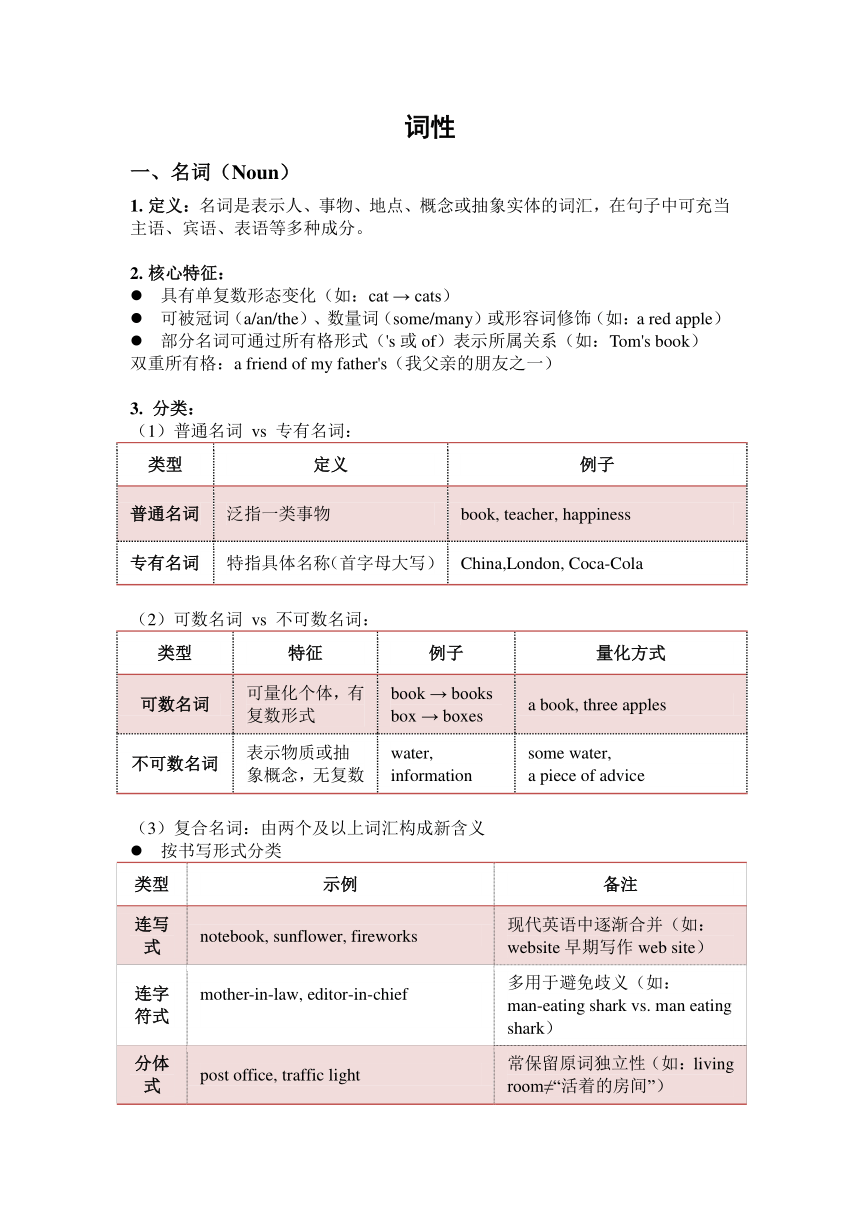
词性 名词(Noun) 定义:名词是表示人、事物、地点、概念或抽象实体的词汇,在句子中可充当主语、宾语、表语等多种成分。 核心特征: 具有单复数形态变化(如:cat → cats) 可被冠词(a/an/the)、数量词(some/many)或形容词修饰(如:a red apple) 部分名词可通过所有格形式('s或of)表示所属关系(如:Tom's book) 双重所有格:a friend of my father's(我父亲的朋友之一) 分类: (1)普通名词 vs 专有名词: 类型 定义 例子 普通名词 泛指一类事物 book, teacher, happiness 专有名词 特指具体名称(首字母大写) China,London, Coca-Cola 可数名词 vs 不可数名词: 类型 特征 例子 量化方式 可数名词 可量化个体,有复数形式 book → books box → boxes a book, three apples 不可数名词 表示物质或抽象概念,无复数 water, information some water, a piece of advice 复合名词:由两个及以上词汇构成新含义 按书写形式分类 类型 示例 备注 连写式 notebook, sunflower, fireworks 现代英语中逐渐合并(如:website早期写作web site) 连字符式 mother-in-law, editor-in-chief 多用于避免歧义(如:man-eating shark vs. man eating shark) 分体式 post office, traffic light 常保留原词独立性(如:living room≠“活着的房间”) 按构成成分分类 类型 构成方式 示例 名词+名词 主体+功能/属性 bookshelf(书架),raincoat(雨衣), airplane(飞机) 动词+名词 动作+受事/工具 swimming pool(游泳池),breakfast(早餐) 形容词+名词 特征+实体 blackboard(黑板),highway(公路), software(软件) 动名词+名词 动态过程+相关事物 dining table(餐桌),waiting room(候车室),reading list(书单) 介词/副词+动词 方向/状态+动作 outlook(观点),income(收入), upgrade(升级) (4)集体名词:表示群体但语法单复数灵活 强调整体作单数:The team is winning. 强调成员作复数:The team are discussing strategies. 功能: (1)主语(Subject) 例:Knowledge is power. (2)宾语(Object) 直接宾语:She bought a necklace. 间接宾语:He gave his sister a gift. (3)表语(Predicative) 例:His dream is to become a scientist. (4)定语(Attributive) 例:a stone bridge(名词作定语修饰bridge) (5)同位语(Appositive) 例:Mr. Zhu, our principal, will give a speech. 名词形态变化规则 (1)复数形式: 规则 原形 → 复数 特殊说明 常规加-s cat → cats 清辅音后读[s],浊辅音/元音后读[z] -s/-x/-ch/-sh加-es box → boxes 发音为[ z] 辅音+y结尾变i加-es baby → babies 元音+y直接加s(如:boys) -f/-fe结尾变-ves knife → knives 例外:roof → roofs 不规则变化 child → children 如:man/men, mouse/mice 单复数同形 sheep → sheep fish单复数同形,但是指不同种类时可用fishes (2)不可数名词量化表达: 容器量词:a bottle of water → three bottles of water 形状量词:a piece of paper 抽象量词:an item of news (3)名词所有格结构: 类型 构成 例子 生命体 名词+'s the student's notebook 非生命体 of+名词 the roof of the house 双重所有格 of+名词所有格 a friend of my father's 特殊用法与易错点: (1)专有名词普通化: 例:He is the Shakespeare of our time.(指"文学巨匠") (2)不可数名词可数化: 例:Two coffees, please.(指"两杯咖啡") (3)复数形式改变含义: 例:custom(习俗)→ customs(海关) (4)集体名词主谓一致: 例:The family is large.(强调整体) The family are all doctors.(强调个体成员 ... ...
~~ 您好,已阅读到文档的结尾了 ~~